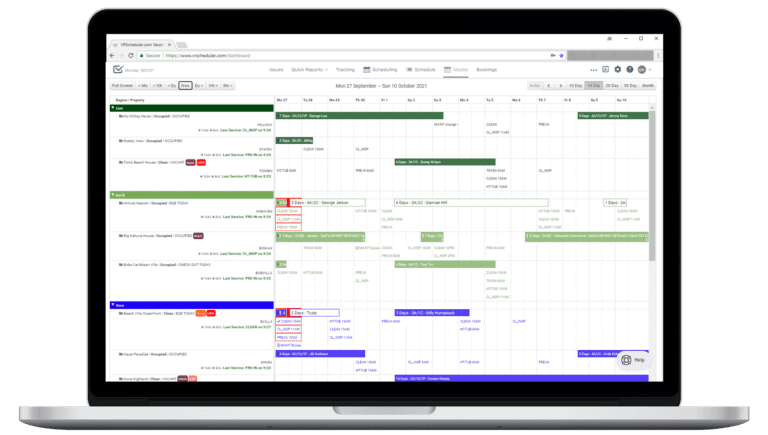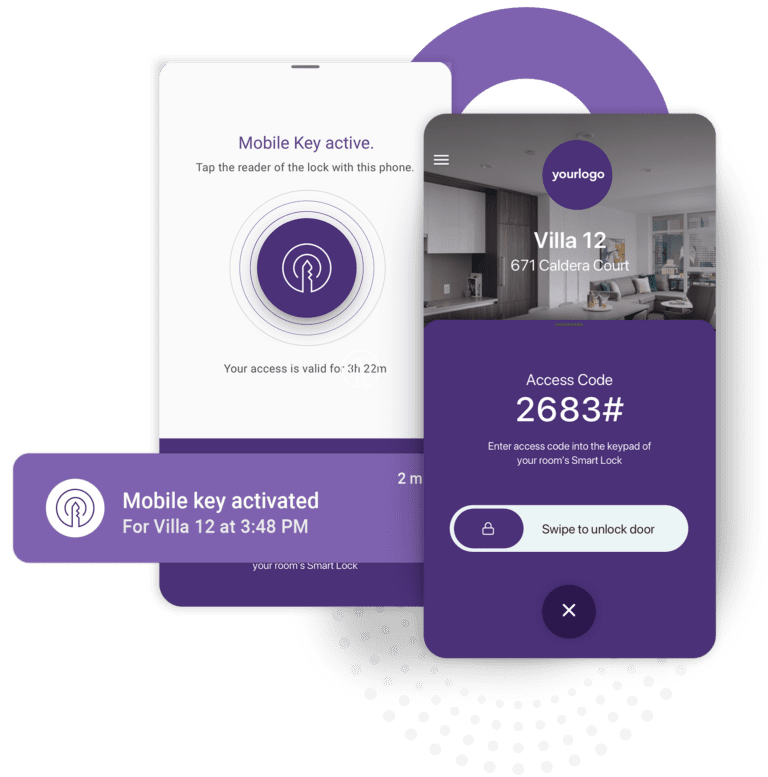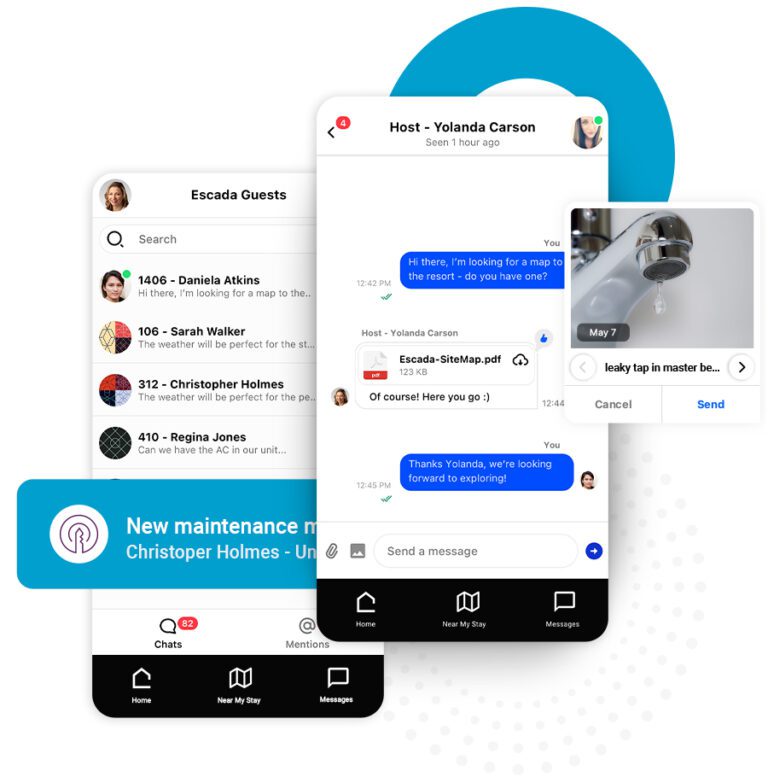5 Steps to Scale Your Vacation Rental Business [2024]
The vacation rental sector is undergoing a period of fast growth, and showing no signs of slowing down.
A recent report by Global Newswire* predicted that the short-term rental market is set to hit $107.14 billion by 2028 (up from $74.64 billion in 2021).
So, there’s clearly an Airbnb marketing opportunity you can take advantage of. But, there are challenges. How can you operate more units during a hospitality labor shortage in a way that doesn’t compromise the guest experience?
With the right planning and tech stack, you can scale your vacation rental business without overloading your team while actually improving your service. That’s because achieving operational efficiency with a view to growing your business, will also allow you to better meet the expectations of your guests.
Table of Contents
Vacation rentals: A fast-growing industry
5 steps to scale a property management company
1. Scale according to your business model
2. Measure performance
3. Keep a lean, coordinated team with tech
4. Build and centralize the right integrated tech stack
5. Understand your profitability
In this article, we look at the five key steps you need to take to grow your business despite the staffing and operational challenges you currently face.
*Report: Global Vacation Rental Market, by SkyQuest at GlobalNewsWire, July 2022.
Want help scaling?
Vacation rentals: A fast-growing industry
Now is an excellent time to scale up your vacation rental management property portfolio. A study by AirDNA found that total revenue for short-term rentals is expected to increase by 42% by 2025, up from a then-record of 61.6% in April 2021.
The same study found that the number of listings on OTAs such as Airbnb and VRBO is expected to increase by 20.5% to 1.3 million on average by 2023.
Much of this growth is being driven by mergers and acquisitions of already-successful vacation rental companies, who are scaling fast to accommodate this growing demand.
These include:
- San Francisco-based property management company Sonder, which went public in 2022, following its merger with special purpose acquisition company (SPAC) Gores Metropoulos II Inc. It raised $310 million in private investment in public equity capital from investors
- Portland-based vacation rental management giant Vacasa, which has acquired more than 200 vacation rental management companies over the years, including TurnKey Rentals which alone added over 6,000 properties to its already substantial portfolio.
- St Louis-based vacation rental management company ABODEbucks, which saw 30-40% growth in 2022, and continues to expand their property count.
Beyond mergers, many big names in the industry are raising serious capital to fund ambitious expansion plans.
These include:
- Melbourne-based online portal Riparide, which raised $4 million to focus on international expansion
- Long-term vacation rental firm Spotahome, which successfully raised $29 million for a similar mission
On a slightly smaller scale, Julie George from Cairns Australia built up a portfolio of over 120 listings over three years through co-hosting, bringing in up to $550k a month.
Julie recently sold her management company Host My Home to a larger conglomerate, Hometime, for over 7 figures, and is now working as a consultant for property managers. She also wrote her book Million Dollar Host—a title that alone speaks to how successful the industry can be.
5 steps to scale a property management company
1. Scale according to your business model
How and if to scale depends on your business model. There are five major types of business models in vacation rentals. Each will demand a slightly different approach.
- Full-service vacation rental management – The company oversees the entire process. It manages vacation rental marketing, listing, pricing, guest communication, vacation rental cleaning, and even staff coordination—without necessarily owning any of the properties. Vacasa is a great example of this. Scaling here will require you to bring on more owner or commercial properties to your books, and to keep those owners happy.
- Online vacation rental property management – Similar to full-service vacation rental management, but entirely online (meaning no onsite management). Reliant on super-smart technology to coordinate everything remotely.
- Scaling this model will require hyper-connected tech, effective coordination of cleaners and staff, and excellent owner-management team-guest communication. It will also need increased numbers of vacation rental owners and properties in your portfolio.
- Hybrid models – Typically describes a vacation rental model that is a combination of long-term and short-term rentals, or an apartment hotel style suitable for longer-term stays, which can also be used for short-term rental accommodation.
- Companies operating on a “hybrid” model say it offers “the best of both worlds” by renting short-term stays that offer a high-end apartment living experience. Scaling this will mainly mean acquiring more multi-family properties in your STR portfolio.
- Master lease – The company rents all available real estate space from the owner for a set price, and then rents to guests (third parties). Scaling will require the acquisition of more space from a larger owner or landlord.
- Franchise model – Typically a model through which a vacation property manager works with an existing trademark and brand, including their existing processes and technology.
2. Measure performance
Before you can scale, you need to get a clear and accurate picture of where your company is at now, and create a comprehensive business plan.
As they say, you can’t change what you don’t measure, so go through a vacation rental property management checklist and set key performance indicators (KPIs), so you can identify what’s working and any areas of weakness.
Tracking your STR operational metrics enables you to make data-informed decisions, and provides you with concrete data to show homeowner prospects.
Possible KPIs to track include:
- Occupancy rate ((the number of booked nights divided by available nights) x 100) – If your occupancy rate is higher than average in your space, your could raise your rates
- RevPAR (revenue per available room). Divide your revenue by the total number of units that were available over the same period. This shows your profitability.
- Average stay length. Many shorter stays can cost you more overall.
- Average daily rate. Shows earning potential (but without operating costs).
- Net operating income. Income generated after subtracting expenses and operating costs.
- Guest satisfaction. Ask guests for reviews and keep track of ratings. Respond quickly.
- Inquiry-to-booking rate. If this is low, you may need to address how you reply to inquiries, whether you take too long to respond, or don’t adequately answer their questions.
- Average response time to an inquiry. Some OTAs like you to reply quickly (within one day) and will reward you if you do (and vice versa). Keeping this fast will please guests.
3. Keep a lean, coordinated team with tech
The key to scaling your vacation rental business without stress or doubling your workforce is using hospitality automation technology.
With automated solutions for guest check-in, guest and team communication, and staff scheduling, you can remotely coordinate operations without losing any visibility.
Running a lean team means:
- Keeping staff numbers low even as you add units. For example, The Annex hotel in Toronto uses automated hospitality tech to have just 1.5 staff members for every 24 rooms.
- Prioritizing remote management. Replace in-person key handovers with keyless entry, and maintain visibility and control over unit status, from a single, all-in-one dashboard.

With standardized vacation rental operations and automated management processes, you can:
- Auto-schedule turnovers based on the latest booking information from your PMS
- Send alerts across your team when there are urgent problems, like a maintenance task or damaged property contents
- Allow your on-the-ground staff to share photos and videos of any issues as and when they arise
- Easily track tasks and staff hours
- Pull reports for payroll in seconds
- Avoid missed cleans because of clunky spreadsheets and manual data entry
This is even more important today, as hospitality labor shortages hit the sector. An August 2022 report by the World Travel & Tourism Council found that 1 in 15 hospitality jobs in the US were expected to remain unfilled by the end of the year.
It also said that “employers in the accommodation industry would fail to find suitable candidates for nearly 1 in 6 of their job postings”, with the shortfall set to equate to 412,000 workers.
One of our customers, co-founder of a leading full-service vacation rental property management company, explained how he managed to reduce his reliance on a large workforce considerably with the help of tech:
“When we came out of COVID, we were very heavy in the management and personnel department. We had maybe nine or 10 managers, and dealing with all the things that go along with having employees.”
“But we were able to cut our management staff down from 10 to four of our really good workers. Digitizing has allowed us to automate. It’s been a really great addition to our processes.”
Want help scaling?
4. Build and centralize the right integrated tech stack
Whether it’s for noise monitoring, guest management, or team coordination, using technology that allows you to implement standard operating procedures and manage them at scale, is central to your ability to sustainably grow your portfolio.
An all-in-one hospitality management platform like Operto is key to getting the most out of your tech solutions, thanks to its range of features and integrations.
With the right tech stack, and the ability to manage it from one dashboard, you can grow your operations without adding complexity to them.
Here are some of the areas where property management software (as well as property maintenance software) can help you streamline and automate your vacation rental business:
- Digital check-in
- Guest communication
- Property access
- Noise monitoring
- Energy control
- Staff scheduling
- Team communication


Coupled with a lean team, an integrated tech stack makes operating vacation rentals less demanding and stressful for you and your entire team. Here’s what our customer said about Operto’s solution to property access:
“I love the unique unit door codes because I can see when people are going in and out,” says our client.
“There are no more needless phone calls on a busy Friday check-in day. We used to have lock boxes and people, you know—say user error, or ice or whatever else—couldn’t get in. But now we can literally unlock it from our dashboard, which is pretty amazing.
“It makes everyone’s lives a lot smoother. There’s no driving to a property at midnight. We can handle it all remotely.”
He also said that offering a modern tech stack makes your company even more attractive to outside owners, enabling you to grow even faster:
“We’re trying to bring ourselves up to a level that will be really hard to compete with. The guest portals, the thermostats, the guidebooks. Digital was the right way to go.
“Operto also helps us a ton on the marketing side of things. We can say to homeowners and potential clients: Nobody else around here offers that. So it’s kind of a no-brainer for them to sign up.”
5. Understand your profitability
Scaling successfully means going beyond the numbers and KPIs, to understand why you’re profitable—or why you’re connecting with your target audience.
Building a brand is a key element here. For example, VTrips, a large US-based property management company, uses local names such as “Mountain Homes” when listing some of its rentals, because that’s what resonates with its local communities. Guests know, like, and trust a local brand, and are more likely to book as a result.
The best tech tools can help you do this, too.
For example, Operto Guest lets you customize your guest messaging platform, house rules, and digital guidebook to your own brand—so you can build trust while establishing fast, two-way communication.
Being profitable also means spending wisely. That may mean keeping your marketing strategy small and word-of-mouth, or investing in proven solutions rather than trying to reinvent the wheel by creating your own.


For example, you can gather insights about guest behavior and preferences by tracking if they:
- Tend to book via OTAs or direct
- Prefer Airbnb Plus or Luxe (see this Airbnb plus checklist if that’s the case for your guests!)
- Like short term rental upsells or prefer to book discounts and deals
- Have a preferred time to book
A hospitality automation platform like Operto enables you to act on this kind of precious insight, and continue to build your brand while understanding which tools and platforms are most important.
Coupled with your own knowledge of your field and client base, this level of insight could be the difference between scaling successfully, and taking on more properties than you can ultimately manage.
Getting ready to scale your property management business: The bottom line
Scaling your vacation rental property management business requires you to:
- Gain a solid understanding of how you’re performing now
- Use automated solutions to make all your operations and management processes efficient
- Grow your portfolio without compromising team performance or the guest experience
With a centralized tech stack, you can achieve this—by simplifying how you manage everything from bookings to housekeeping to guest communication, and saving hours of time on day-to-day tasks.
This way, you can finally start operating strategically as you look to delight your guests and homeowners.
More Articles
Want an operations tool that’s smooth and flexible?
![5 Steps to Scale Your Vacation Rental Business [2024]](https://operto.com/wp-content/uploads/2022/11/shutterstock_1575539170-scaled.jpg)


